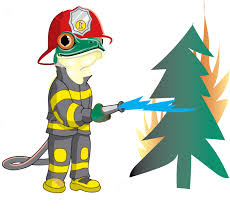Most wildfires are started by careless humans. Some years ago, there was a delightful character named Smokey the Bear who warned, "Only YOU can prevent forest fires." Humans, you need to bring Smokey back...and listen to him. But enough about pointing the blaming finger. That never works. Instead, let's take a look at some causes and the origins of wildfires.
Earth has been in existence for some four billion years. but conditions conducive to spontaneous wildfires have only been around for four million years, give or take. "A naturally-occurring atmospheric fire did not have the chemical elements available until major several earth changes occurred." The earliest life forms emerged without needing oxygen and lived about 3.5 billion years ago in a carbon dioxide based atmosphere. Life forms that required a little bit of oxygen came much later in the form of blue-green algae. They, ultimately, changed the earth's atmospheric balance toward oxygen and away from carbon dioxide. Photosynthesis began to dominate earth's biology and increased the presence of oxygen in Earth's air. Green plant life exploded. "Aerobic respiration became the biologic catalyst for terrestrial life. Around 600 million years ago and during the Paleozoic, conditions for natural combustion started developing with increasing speed."
Fire needs oxygen and heat to ignite and spread. Wherever forests grow, the fuel for the fire is "provided mainly by continued biomass production along with the resulting fuel load of that vegetative growth. Oxygen is created in abundance by the photosynthesizing process of living green organisms so it is all around us in the air." So all that's needed, then, is a source of heat to provide the chemistry necessary to create a flame.
Wood, leaves, and brush form natural combustibles. When they reach 572 degrees, gas in the steam given off reacts with oxygen to reach its flashpoint with a burst of flame. That resulting flame then preheats surrounding fuel (wood, leaves, brush). These new flames, in turn, heat up and cause the fire to spread out-of-control and, poof, you have a raging forest fire.
Forest fires that are caused naturally, without aid from humans, usually start with dry lightning "where little to no rain accompanies a stormy weather disturbance. Lightning randomly strikes the earth an average of 100 times each second or 3 billion times every year and has caused some of the most notable wildland fire disasters in the western United States." Because these lightning-caused wildfires strike most often in uninhabited areas with limited access, they burn more acres than human-caused wildfires.
"Still, human fire activity is the primary cause of wildfires, with nearly ten times the start rate of natural starts. Most of these human-caused fires are accidental, usually caused by carelessness or inattention by campers, hikers, or others traveling through wildland or by debris and garbage burners." And sadly, some are intentionally set by arsonists.
There are three primary types of wildland fires.
1. Surface fires - These typically burn steady but at a low intensity. They tend to consume the entire 'fuel layer" without affecting the mature trees and their root systems. "Fuel buildup over many years will increase intensity and especially when associated with drought, can become a rapidly spreading ground fire."
2. Crown fires - These fires generally result from intense rising ground fire heat and occur in the crowns or upper portions, of the draping trees. The result is a kind of "ladder effect" where hot surface fires climb the tree to its canopy. This can then cause the embers to blow and flaming branches to fall into unburned areas. This, of course, causes the fire to spread.
3. Ground fires - These are the most common wildfires and the ones that can potentially destroy all vegetation and organic matter, leaving behind only the scorched bare earth. They burn intensely. "These largest fires actually create their own winds and weather, increasing the flow of oxygen and "feeding" the fire."
Forest fires affect every living thing. And while most of them are accidents of nature, humankind can do their part to prevent even more fires from occurring. Pay close attention to your surroundings and never carelessly tossing out anything that can cause a spark. It's fun to camp and hike in the summer but when you do, please be careful not to leave behind your trash and campfire embers.
Smokey the Bear and Fred the Fire Frog are relying on you to help keep our beautiful natural resources, our home, safe from forest fires.
I invite you back here tomorrow, but until then, stay safe and I wish you
PEACE,

 RSS Feed
RSS Feed